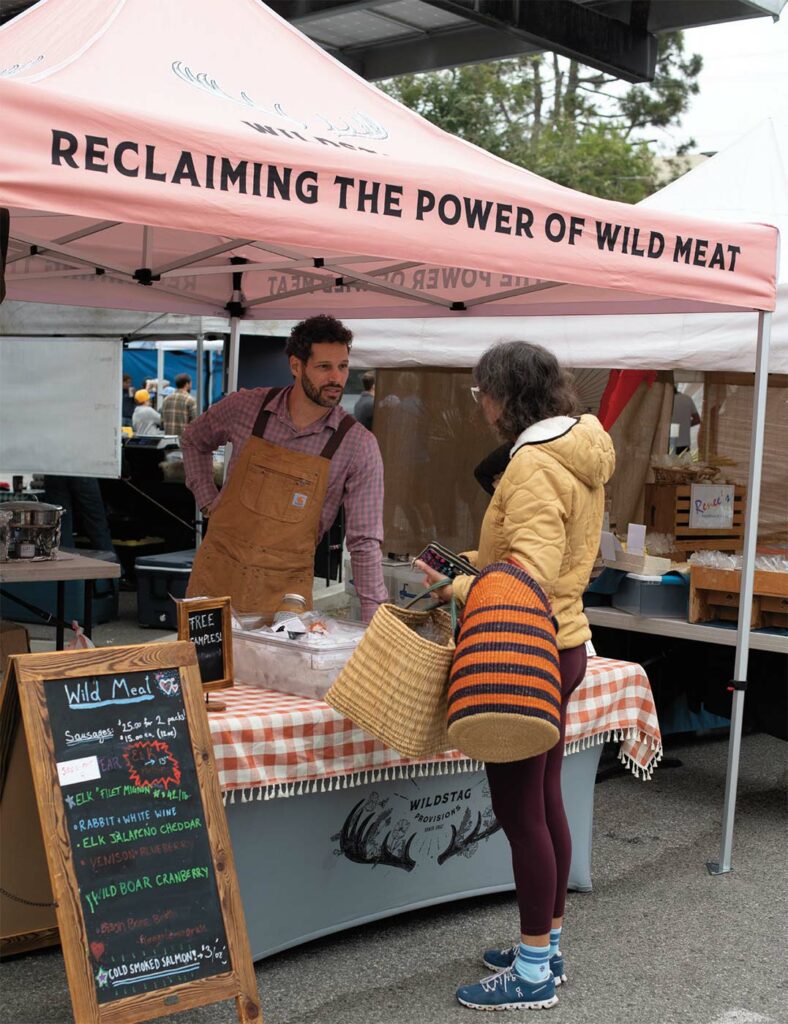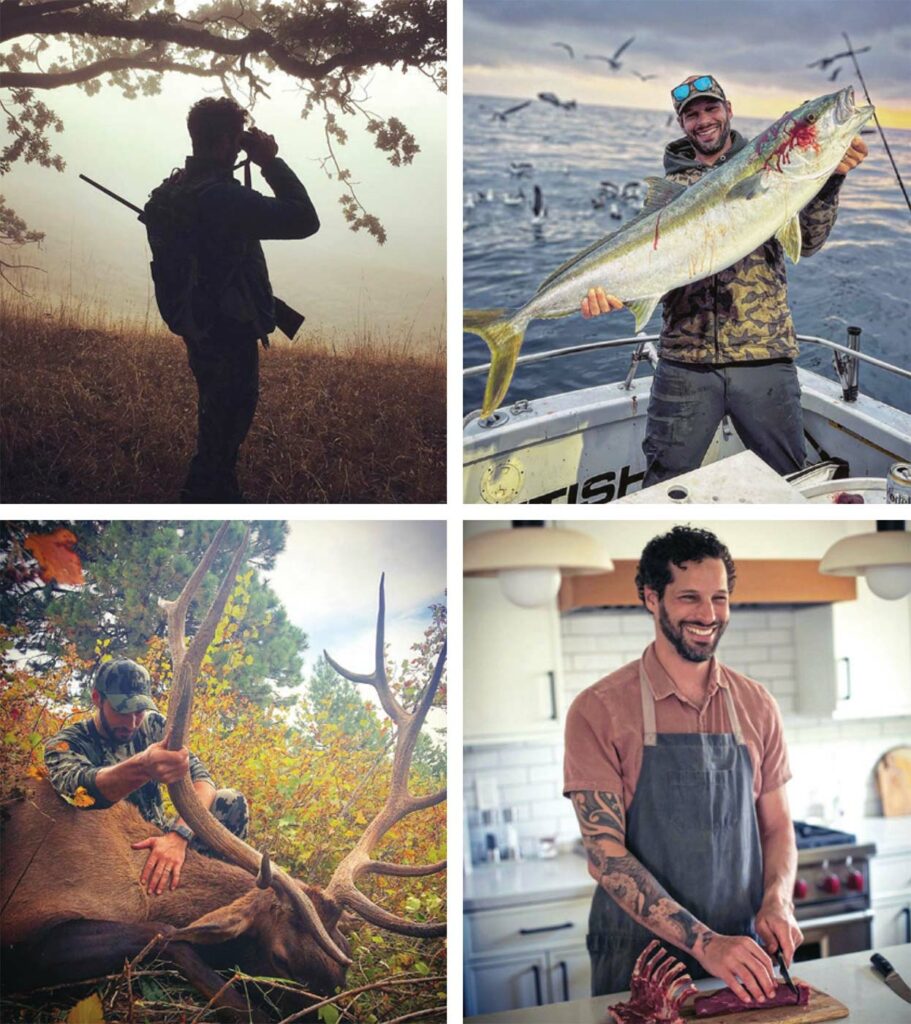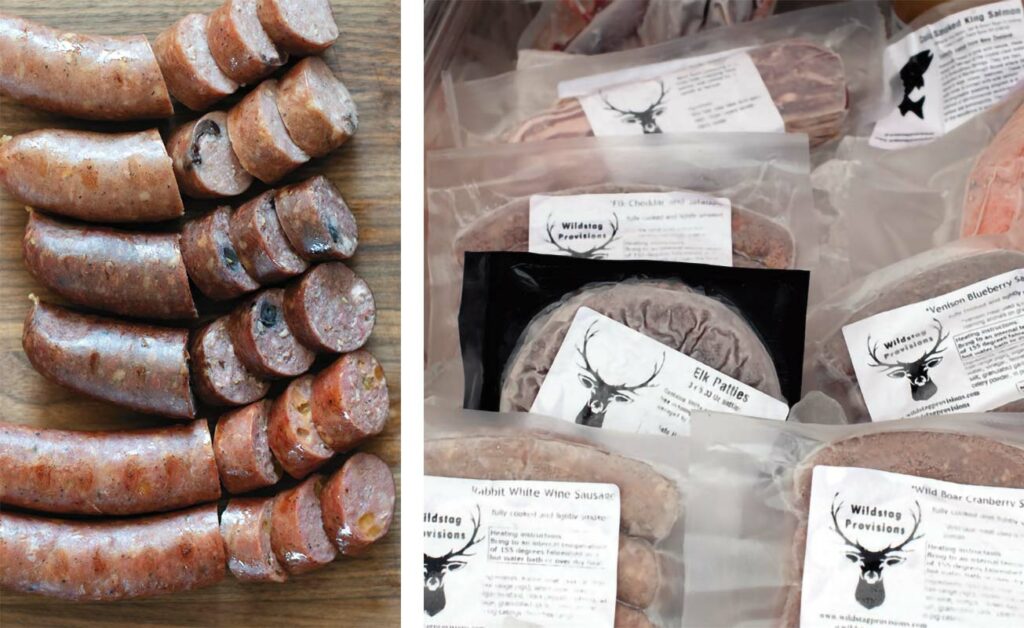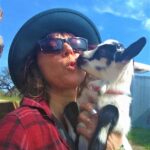
Daniel Laggner is on a mission to protect American wildlife by selling free range game meat
PHOTOGRAPHY BY COLINE LECONTE
Throughout his Austrian childhood, Daniel Laggner spent weeks at a time on his grandparents’ farm in the southern province of Carinthia. While his grandmother baked bread and churned butter from their cows, Laggner’s opa grew wheat and hunted.
“My twin brother Jakob and I never consciously thought anything about the fact there would be a whole deer hanging in the cellar,” says Laggner. “It was perfectly normal to us, and aside from a few staples, everything was made from what was hunted or from the farm.”
Although Laggner and his immediate family immigrated to the United States when the boys were 16, those early experiences with alpine agriculture and subsistence hunting planted a seed for the teen that decades later would manifest as Wildstag Provisions.
An avid “ethical” hunter and fisherman (see sidebar page 50) and an academically trained conservationist, Laggner launched his Santa Cruz-based company in 2021. He sells high-quality, free-range game sausages (think elk with jalapeño and Cheddar, venison-blueberry, rabbit with white wine, wild boar-cranberry, smoked bison), bone broth and more sourced from sustainable ranches and farms.
Laggner describes his products, which are sold online and at the Westside farmers market in Santa Cruz, as “wild meat” because they’re not from domesticated species and the government has no regulation on the terminology used to describe and differentiate wild game species from farmed or feral animals. It’s also prohibited to sell hunted game, says Laggner.
The creation of the Lacey Act in 1900 made the sale of hunted meat for monetary gain illegal to protect wildlife populations from market hunting and to ensure the meat is inspected by the USDA prior to being sold. The ranches from which Wildstag procures its meat allow the animals to roam on thousands of acres of pasture, where their lives are spent engaging in natural behaviors.
While Laggner’s upbringing fostered his love of the outdoors and terrestrial wildlife, he initially wanted a career with marine mammals. “Since I was young, I wanted to work with whales and dolphins, but once I was actually employed in that field, I realized it wasn’t for me,” he says.
Laggner moved to Pacifica in 2008 to complete his master’s degree in environmental studies and work on his thesis on blue whale research. He was living with Jakob, and the brothers frequently visited Santa Cruz to surf. When Jakob moved to Scotts Valley in 2009, Laggner found himself crashing at his brother’s place whenever possible and relocated to Santa Cruz soon after.
It was during this time that Laggner began to realize that his chosen career wasn’t a good fit. Eventually, he came to the realization that his dream job encompassed two of his other passions: butchering and cooking wild game.
“I’ve always loved being in the kitchen and once I started hunting in my early 20s, it unlocked a new challenge for me, which was turning a whole animal into delicious table fare,” he says. “Creating a business by expanding my culinary skills from serving friends and family to my community really resonated with me.”
“By far the most important thing to me in sourcing meat, be it hunted or farmed, is the quality of the animal’s life.”

SUSTAINABLE ALTERNATIVE
Wildstag is also a platform on which Laggner can educate the public about the conservation aspects of hunting native wildlife populations. “The money generated by hunting license sales, as well as federal excise tax on firearms, ammunition and angling equipment contributes to as much as 80% of the funding for state wildlife agencies,” says Laggner, adding that the money is then used to survey animal populations and habitat to ensure they’re healthy and sustainable. A decline in hunting would restrict funding, thereby leaving wildlife agencies inadequately staffed and unable to protect critical habitat.
Of the potentially controversial nature of his business, Laggner says, “I had no reservations about the concept because the foundation and philosophy are something I wholeheartedly believe in. If someone wants to argue with me, I’m happy to talk to them.”
Indeed, Wildstag’s farmers market booth usually has a small crowd eager to learn more about Laggner’s products and meat sourcing, which he views as a more sustainable, animal welfare-focused alternative to commercially raised livestock. “By far the most important thing to me in sourcing meat, be it hunted or farmed, is the quality of the animal’s life,” he says. “It’s the main criteria I have for vetting my producers.”
As with domestic livestock, game species have diversified feeding patterns. Elk and bison are grazers and require significant pasture on which to roam, while deer are browsers that need a variety of vegetation. “If the habitat, acreage and food sources aren’t present for these species, they don’t have the ecosystem they’re genetically adapted to,” says Laggner.
“And, unlike cattle, sheep or pigs, game species eat and then move on, which keeps the ground vegetation intact, allowing for proper regrowth and soil health.” Wildstag’s bison, elk and venison come from Wyoming’s 55,000-acre Durham Ranch, a family-owned operation that also provides Laggner with domestic meat rabbits. Prior to slaughter, the animals are placed in a holding corral so that a USDA inspector can oversee the process, which is done in a certified processing facility on-site.
The wild boar—technically, feral hogs—come from Texas, because that state has a trapping program that allows the animals to be sold on the open market, with USDA inspection before and after slaughter. These invasive opportunistic omnivores are now found in 40 states and cause billions of dollars annually in damages to wetlands, waterways and agricultural, forestry and public park lands. They also consume the eggs and young of birds, wildlife and domestic livestock. Fortunately, feral hog meat is also tasty and low in fat, making it a desirable product.
DREAM JOB
Laggner learned to field dress (removing the internal organs to cool the carcass and help preserve it until it can be refrigerated) and butcher wild game due in part to a former job in a veterinary tissue lab which required expertise in animal anatomy and dissection for scientific research. He orders primal cuts of meat from his purveyors and breaks them down in a commercial kitchen in Scotts Valley for use in his various products.
Because game meat is extremely lean, proper technique is required to avoid overcooking, but foods like sausages and Wildstag’s venison heart and liver Primal Meatballs, required exhaustive research and development. To compensate for the low-fat ratio in the meat, Laggner supplements the sausages with lard from Pajaro Pastures hogs, while the meatballs are made more succulent by the addition of chicken liver. One of Wildstag’s best-selling products is a lemongrass- ginger bison bone broth, but there are also packaged cuts of meat like venison medallion, wild boar shanks and elk loin roasts.
For Wildstag’s applewood cold-smoked salmon, Laggner says the search for a sustainable wild source eventually led him to the realization that salmon populations worldwide are in decline. Because our local fishery was closed for the 2023 season, he sought a farmed alternative that met his criteria, which led him to New Zealand King Salmon, an aquaculture farm on the South Island. “I prioritize animal welfare and environmental stewardship over geographic distance, and no other country that I’m aware of has a salmon farm of this quality,” he says.
This type of due diligence is what makes Wildstag Provisions so special. While the quality of Laggner’s products is exemplary, it’s his commitment to conservation that raises the bar for makers and food purveyors.
“Offering something good to my family and community and fostering education via my local farmers market is as close to a dream job as I can get,” he says. “I hope we become known as a staple in Santa Cruz, like, ‘You want something special to eat? Go to Wildstag, but watch out, he’ll talk your ear off about protecting wildlife.’”

THE MEAT OF THE MATTER
Laggner primarily hunts deer in the mountains of California, which also fulfills his love of remote, rugged wilderness. To be a mindful, ethical hunter, “it’s absolutely critical to be educated on the regulations and wilderness savvy, as well as an expert marksman,” he says. “Beyond that, every hunter should understand the basic biology, ecology and seasonal variations of the species they’re targeting.”
Hunters must also factor in equipment, hunting strategy, time management and navigation skills, and have the knowledge and ability to field dress the animal, pack it out, prevent spoilage and utilize it in a manner that limits waste. “It’s a mountain-to-plate approach,” says Laggner, who follows the Association of Fish & Wildlife Agencies’ North American Model of Wildlife Conservation. It operates on seven interdependent principles, which state:
- Wildlife resources are conserved and held in trust for all citizens.
- Commerce in dead wildlife is eliminated.
- Wildlife is allocated according to democratic rule of law. • Wildlife may only be killed for a legitimate, non-frivolous purpose.
- Wildlife is an international resource.
- Every person has an equal opportunity under the law to participate in hunting and fishing.
- Scientific management is the proper means for wildlife conservation.
About the author
Laurel Miller is a food, spirits and travel writer and the former editor of Edible Aspen. She grew up on a California ranch and has been writing about regenerative agriculture for over 20 years. When she’s not tethered to her laptop, Miller enjoys farmers markets and any trip that requires a passport. She’ll take a Mission burrito over a Michelin star, any day.
- Laurel Millerhttps://www.ediblemontereybay.com/author/laurelmiller/
- Laurel Millerhttps://www.ediblemontereybay.com/author/laurelmiller/
- Laurel Millerhttps://www.ediblemontereybay.com/author/laurelmiller/
- Laurel Millerhttps://www.ediblemontereybay.com/author/laurelmiller/



